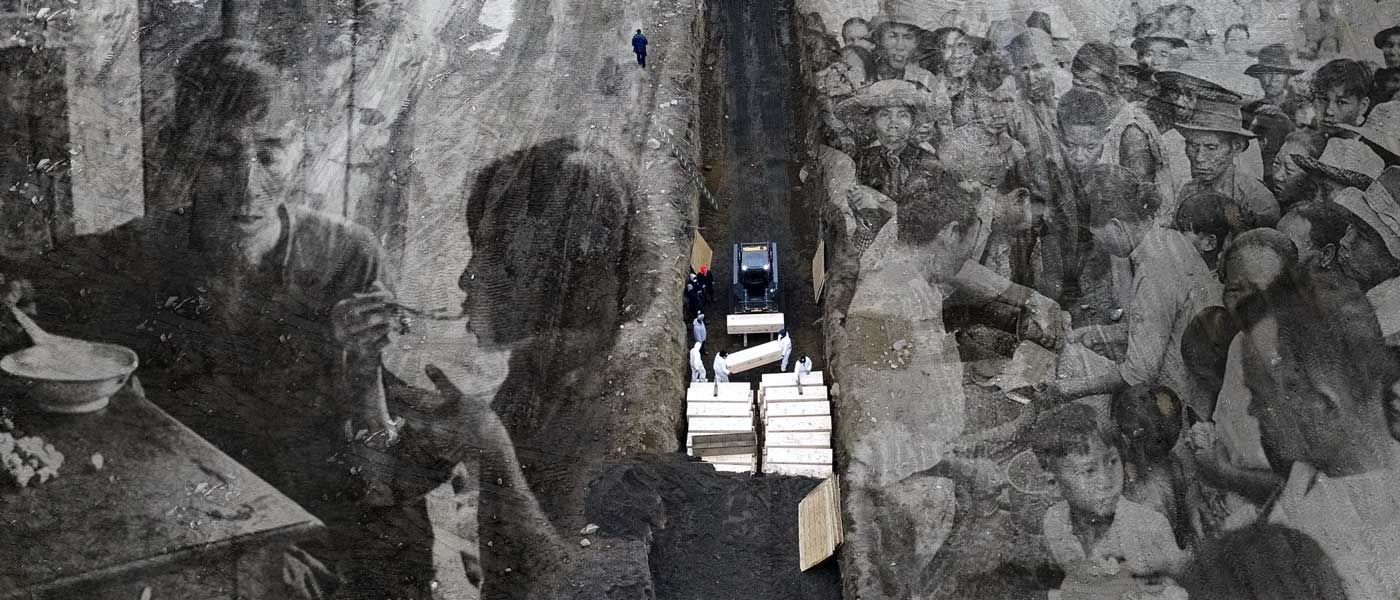In the photos taken before I wore it, the gown hangs from a grape arbor. You can make out the beaded detail of its bodice, the hourglass curve of its skirt.
I have no memory of looking into a mirror before or after, but I must have. What I do recall is slipping out of my bathrobe and stepping into that gown. A hefty alabaster satin, it was an unlikely choice for summer. You could bustle the train with a pin, or you could let it trail behind you.
As an image, the gown does not look much different hanging from that arbor than it does from my shoulders. It hovers above the ground in the silhouette of a woman.
I was twenty when I began seeing the Land of X, and twenty-four when we promised to stay together.
There were hills that day and, in the distance, mountains. I had no idea how steep the climb ahead would be, what the landscape would have in store for me.
Fast forward three summers: come autumn, the Land of X began his doctorate at one university, and I began mine at another. There were logistical and financial reasons why the Land of X and I lived in different cities that year, but those don’t really matter.
I was twenty-seven and I was lucky; I was studying at the oldest Creative Writing PhD program in the country — I would have five years to dedicate myself to what I most loved doing.
All the while, I would stay on the promising road that brought me to the Land of X — my other commitment.
The Land of X is not an easy place to describe. Both tropical and polar, dry and marine, it could present itself as an atmosphere or a terrain; a place that, regardless of its climate or topography, required a map for anyone to negotiate.
There was also an inherent contradiction to these extremes.
Fresh cut flowers, for instance, were considered wasteful in the Land of X. Why buy what’s going to die anyway?
But I did buy flowers anyway. Whenever I’d place them in a vase, he’d rearrange my work so I could see how to display them the right way.
For nearly a decade, I’d watch these arrangements bloom fully, then droop, and eventually wither away.
I was always writing.
The Land of X would often remark: You are always in your head. Though having never written fiction himself, he had plans to write a novel.
Someday, it will happen.
My first semester in the city, I often rode the bus to campus, or else friends drove me. On the rare occasions when I drove myself, I entertained visions of losing control and plowing into oncoming traffic.
I had been told by the Land of X that I did not drive well.
During the first semester of my writing program, a hurricane made landfall.
In anticipation of what was to come, I’d watched the meteorologist track its messy progression from the gulf to the shore. The length of time it hovered over the city was among the many reasons it was distinctive.
Day in and day out, I was deeply aware of my aloneness. I longed for the storm to pass, for those around me to stay safe and protected — too much damage had already been done. At the same time, I wanted to protect my solitude.
Alone, the rain battering my window, I’d consult my reflection: the silhouette of a woman. You are here, this is the life you have made.
But also: What the fuck is wrong with you? Be thankful.
What he said wasn’t true — about my driving, that is. Rarely had the Land of X ridden with me in the driver’s seat. At the time, I’d probably shrugged it off; I was used to hearing such criticisms echo in the Land of X. Trusting his distorted perceptions more than I should have.
He’d say he knew me better than anyone.
Most of the time, I believed him.
After the storm cleared, leaving the city with its destruction — hundreds of thousands of homes damaged, their residents displaced — I met with a therapist. Her office was stuffy, walls the color of gravy.
A few sessions in, she suggested I wanted to get away from the Land of X. Had that ever occurred to me?
I canceled her services shortly thereafter. This isn’t working, I told her.
In the mirror, the image of one’s movement is always slower than one’s actual movement.
Unlimited Raisin, Crisp Magenta, Almond Hustle, Berry Bliss, Strike a Rose, Citrus Slice —
Lipstick doesn’t look natural.
It didn’t matter what shade I wore. He preferred me without lipstick.
In the Land of X, I was governed by want, a warped desire to please. Rules became law.
There were so many laws to keep track of. Avoiding lipstick was just one example.
That all women who look into mirrors are vain is a misconception. Sometimes women look into mirrors to confirm that they are still here.
Another law: one should not bathe without remembering to scrub the tub.
Taking baths is like bathing in your own filth.
How many miles in before I stopped pushing back, stopped speaking up when a law in the Land of X didn’t align with my beliefs, my memory? Somewhere along the way, I learned it was easier to nod my head in agreement when it came to the opinions I disagreed with. I was separating from my body, or my body was separating from me.
Was it my imagination, or was the road beneath my feet crumbling too?
If one spends too much time attempting to navigate the wilderness of the Land of X, they risk incurring long-term consequences for the brain. Or becoming lost entirely.
While pursuing my degree, I also taught creative writing classes for the local community. I began encouraging my fiction students to think of their characters’ tics. I described someone who was continually twirling her hair, how particular that behavior is for an adult. People like this, I told them, are probably anxious. They have a lot on their minds!
At the end of the workshop, one of the students mentioned that I twirl my hair.
Haha, how funny.
Did I realize?
Coerce can be traced back to the Latin, coercere: “to confine, to restrain, to repress.” It can be difficult to recognize coercion when there are no marks to evince it.
Day after day, light fell at a slant. Long after the hurricane had cleared, my longing for solitude remained. On my own, I nearly felt complete.
In the Land of X, I was an endless work-in-progress, a draft.
Years later, it’s easy to forget certain things. Like a third law of the Land of X, which stipulated that I must one day let my long brown hair grow gray.
Never mind that I was in my twenties when this was first imposed — or that the preference was shaped by the fact that his own mother had let her hair go this way.
Yesterday, I found a single silver strand while I stood brushing my hair in front of the mirror.
In the Land of X, one must anticipate the shifting landscape. How the very ground beneath one’s feet will shift, tilt you off balance.
You’re a liar.
Projection occurs when the manipulator accuses the target of the quality about himself that he fears most.
The Land of X would call me manipulative.
You exaggerate.
A fourth law in the Land of X: all of our children would be boys — blond, and light-eyed, like him. Features that were the opposite of mine. Living in the Land of X meant not only conforming to his vision, but also reproducing his mirror image.
You’re trying to be unhappy.
Who tries to be unhappy?
The Land of X had a way of exerting pressure on me. His hand, for instance, on my stomach during road trips, when I’d ask him to pull over so I could use the bathroom. He would then laugh and keep driving.
Another law. One must suppress their urges in the Land of X — even those deemed essential or unavoidable.
Holding it in is good for you.
What I tell my writing students:
Everything you write is important.
Keep a document for experimentation.
Don’t be afraid to mess up, to ask questions.
Yours is a story worth telling.
I remember with precision the day I began cutting my portions. It followed the day after the Land of X and I attended a party, and the host sent us home with pie — a slice for him and a slice for me.
Later, in the blunt glow of the kitchen, against the winking glint of appliances: my face bowed over the first empty Tupperware, a scrim of cream filling puffing the rim.
I was already tearing into the Land of X’s portion but couldn’t taste anything.
More than eating, more than sleeping — I was always writing.
I didn’t eat red meat, but the Land of X vowed that I would begin to do so by the time I was pregnant. This, yet another law, and one he said I’d enjoy.
You’ll have to do what’s best for the baby.
Eventually, he convinced himself he wanted to homeschool his children, to be a stay-at-home dad.
He claimed that if the roles were reversed, I would be too busy writing.
In the Land of X, the trees lost their leaves, then their branches. Bark sloughed off their trunks. Soon, everything was uphill. Everything hollowed out and parched.
Body dysmorphic disorder yields a warped view of one’s appearance. When coping with it, the brain invents a flaw or exaggerates a physical feature. It might not be a flaw at all. Like the machinations of the brain that invents the flaw, it, too, might also be an invention.
As I got smaller, my voice changed, lilted higher.
Holding it in is good for you.
Down to ninety-two pounds, I lost the ability to make decisions.
Every day, I arranged and rearranged my flowers.
What scared me most: being disbelieved.
He was so nice! Everyone said so. People seemed to enjoy their brief visits to the Land of X. Why shouldn’t I enjoy being there, too?
I made sure to praise him outwardly to acquaintances, family, and friends. I reflected what I wanted to be real about him. The Land of X turned carnival, a funhouse mirror.
To this day, I’ll log into the Cloud and rediscover photos of a thin, beaming young woman.
During my final year with the Land of X, we lived in a suburb between our universities, across the country from our families.
We rarely had friends over. Or went out to see them.
Instead, I walked the two-mile loop around the lake out back and habitually forgot the season. It was easier to take the path there. Less erratic than the trek through the Land of X.
Disassociation: A discontinuation, a rupture. A break in the connective tissue between what’s happening in one’s mind and body, what’s unfolding around them.
Making my mind go elsewhere was how I survived in the Land of X.
Shortly after we moved to the suburbs, I began volunteering at a memory care center. A choice spurred by longing, by desperation: I wanted to feel close to someone or to something. To help those who were vulnerable.
Often, I felt guilty for feeling the way that I did. I poured my energy into doing things for others, avoiding the thought of what it would be like to go someplace where the ground didn’t crumble beneath my feet. To leave the Land of X —
At the memory care center, there were two major rooms for the residents to gather.
There was the recreation room with the large TV, and against the back wall, a nursery for those who wanted to mirror parents, who tended to dolls like real babies. Then there was the main living room with its sky-blue couches, cream-colored carpet, and big windows with a view of the courtyard.
That was the first room you encountered upon stepping foot in the center. It’s where the residents who were in the early stages of the disease drank their coffee, played games. Those were the residents who didn’t yet require a caregiver to help them eat.
I remember seeing myself in the mirror opposite the table, my mouth opening as I drew in forkfuls.
For Alzheimer’s patients, the forgetting has to do with damaged nerve endings. The more time that passes, the greater the injury.
But the person with Alzheimer’s does not notice these changes. Like trauma-affected brains, brains afflicted with Alzheimer’s will compensate for the damage that has occurred to them.
It happens in stages. The initial symptoms are hidden and can begin as early as twenty years before a person notices them.
It took me years to recognize that anything was actually wrong with the situation I was in.
Spring became summer, or summer turned to fall.
I got healthier, gained back what I’d lost.
Mirrors were discouraged at the memory care center. It could be disorienting for residents to encounter their own reflections. Some translated what they saw as a stranger.
As my body began to recover, the Land of X said he was glad I’d gotten my ass back.
It was something to think about losing part of yourself, then regaining it. One could lose themselves entirely in the Land of X — what would the process of total recovery entail?
I often wondered if the mirrors I gazed into weren’t two-way mirrors. Or maybe I simply wanted them to be, if only for someone to intervene.
I am still wondering what my memory does and does not retain.
In my shared apartment with the Land of X, my best days were the ones when we were apart. While walking, the lake’s bluish surface was broken and choppy. Whenever the wind blew my hair into my face, I’d quicken my pace, unable to see straight. But trusting the ground would remain steady beneath my feet.
Twice, a resident at the memory care center fell on my watch, and both times, it was as though I were watching the fall in slow motion, the body plummeting forward.
Portrait of my body positioned in the Land of X: Portrait of my body / behind a window / inside a mirror / within an apartment / overlooking a lake made of glass. A lake my body could easily fall forward into.
You can retrain the brain’s memory of trauma, but you cannot erase the trauma altogether from the brain.
While working with the residents, you must not let them see you upset.
Memory care patients read into faces.
In the Land of X, one must work to make their face unreadable.
You’re so much better than you used to be.
The arid season commenced. In the Land of X, the air grew hot and dry; it was all the better to catch fire.
While the minds of the residents I worked with were slowly deteriorating, I was beginning to recall what it was like to feel things.
I soon became struck by the narrow distance between the balcony and the bed, for instance. How easy it would be to walk out.
There were many nights when I found myself floating into the dark.
The last time the Land of X saw me he hugged me so hard, I pulled away —
Daylight gave way to darkness, and inside the dark was a car on a long, lit path.
After our final meeting, I drove down one block and then another. Maybe I called my parents, my sister — I don’t remember. But I did pull over, cut the engine. My pulse thrumming my temples as I laid my head against the wheel.
I was exhausted and afraid, relieved and enraged.
Eventually, I got my voice back, too.
So many things would change, from my passwords to the name I used to introduce myself to strangers.
Yes, my name is Theodora Ziolkowski, I told a customer service representative between my teeth.
Imposter syndrome: The failure to reconcile the person you are with the person you believe yourself to be. A doubling borne from doubting.
To this day, I am still pained by situations for which I must continuously prove myself to be believed.
The first week I lived on my own, I listened to Mia Farrow narrate the audio recording of Ira Levin’s Rosemary’s Baby.
While Rosemary was decorating and refurbishing the Bramford, I was washing the glasses and silverware I bought from Target, drying each piece before carefully setting it into the cupboard. Finding homes for my belongings in the garage loft that I alone was renting.
At one point, I dropped a plate while I was unpacking.
This is no dream! This is really happening!
The first thing my friends said when I told them I’d left the Land of X: You look like yourself again.
In the months after, I filled my hours studying and holding hands with the residents. I taught more creative writing classes, trained to teach a barre class. I was eager to reconnect with my body in ways that my body remembered.
Other times, I cruised through the clotted arteries of I-10 and 290, listening to podcasts about loneliness and self-love, stories from divorcees. In one, a woman who leaves her husband describes how her husband warned her that, without him, her life would shrink to the size of a postage stamp.
Forgetting painful memories can be a mode of survival. Once separated, one may choose to block out certain moments from being in the Land of X — until something in the present happens, and then one remembers.
When a student in my fiction workshop turned in the first chapter of her novel, she gave the class the disclaimer: I don’t know if my protagonist should get out of her marriage.
The husband in her draft was emotionally and physically abusive. These traits are enacted in the novel’s opening pages.
Well, your character should probably change in some way, I told the student gently.
And though the student asked me directly what I thought the wife’s course of action should be, she also retorted that she didn’t want to make it appear as though it was so easy for her.
I want readers to see how hard it is. They’re not going to get it.
It was while driving in the dark, listening to the part that Rosemary discovers the claw marks on her body, that I saw a shape bloom in the middle of the road, red eyes and white fur.
I pumped the brakes, just missing the body —
The possum resembled a zombie bride dragging herself away.
I, too, dragged myself away.
After I made it past the barre teacher audition, it was time to learn the choreography.
Where I struggled was memorizing what move to do next. I kept reversing the order of when to do which. There wasn’t enough space left in my mind to keep track.
During training, I made my arms copy the trainer’s arms. I watched the mirror.
When I left the Land of X, it was as if I had been freed from some invisible corset. Or like my chest had never been caged to begin with.
Only then did I find the language to say this.
When I failed to reproduce the movements exactly, I felt a jolt when the trainer adjusted me.
I didn’t need anyone to make me move a certain way.
All these years later, the wild relief of having left can still surprise me.
What a wonder, to find yourself in a different position — a different place — than you imagined.
Some days I look back on that time, and some days I don’t. Now, there is an immediacy to everything I do. The ground solid, the sun rising and falling just there, on the other side of those trees.
A year ago, I was exploring the grounds of the little university town I now teach in. The sky was a brushwork of rouge and lilac, the dirt roads bright with frost. And it was almost as though I were driving through a still life, or as if the great rush of my life were fresh paint on a canvas: a flurry of colorful strokes, every inch of backdrop covered over.
Everything beating for its life like a heart.




